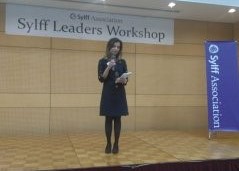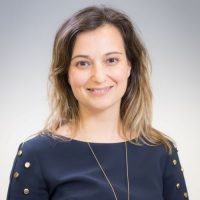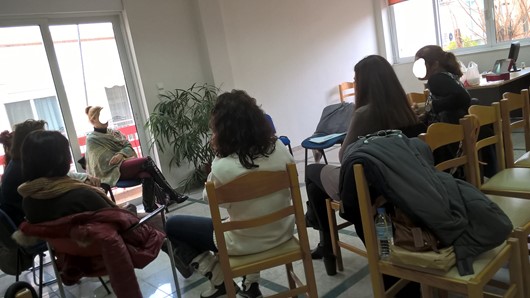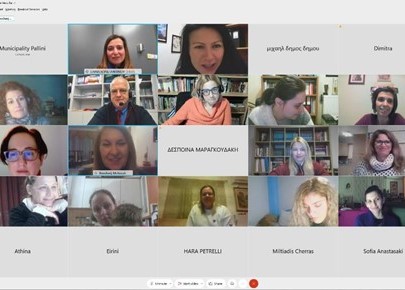Voices from the Sylff Community
Sep 3, 2021
Municipality of Pallini, Greece: How Covid-19 Has Affected the Delivery of Supporting Services
Eleni Konstantinou, a 2001 Sylff fellow, is a psychologist and group and family therapist who now works for the municipality of Pallini, Greece. She discusses how the measures in response to COVID-19 have impacted social support services in the municipality, with personal observations about how people, including herself, have adjusted largely positively to the lack of direct contact.
* * *
The aim of this article is to present how COVID-19 and the imposed measures have altered, changed, and affected the delivery of supporting services such as psychological support, consulting, and lifelong learning programs in the Municipality of Pallini.
 I am a psychologist, family and group therapist, and a member of the Sylff community. I received the Sylff grant in 2001 during my postgraduate studies in school psychology. In 2018 I was very honored to be chosen to attend the Sylff Leaders Workshop in Japan—a great experience that helped me deepen my knowledge in international cooperation for a common goal. I had the chance to meet and communicate with exceptional people from all over the world who are expert in their field of work and studies. I also had the privilege of experiencing and tasting Japan’s culture. I am more than thankful to the Sylff Association secretariat for organizing this memorable and unique event with great success.
I am a psychologist, family and group therapist, and a member of the Sylff community. I received the Sylff grant in 2001 during my postgraduate studies in school psychology. In 2018 I was very honored to be chosen to attend the Sylff Leaders Workshop in Japan—a great experience that helped me deepen my knowledge in international cooperation for a common goal. I had the chance to meet and communicate with exceptional people from all over the world who are expert in their field of work and studies. I also had the privilege of experiencing and tasting Japan’s culture. I am more than thankful to the Sylff Association secretariat for organizing this memorable and unique event with great success.
I have been working in the Municipality of Pallini (Region of Eastern Attica, Greece) for a decade. Since 2016, I have been in charge of the Education, Continuing Education, and Culture Section of the Department of Social Policy.
The mayor of Pallini, Mr. Athanasios Zoutsos, expresses the basic principle of the municipality during the pandemic as follows: “Νo one should be left alone, without access to public services in these harsh times.” But how could this happen? Is it possible for people to access public services when there are strict measures on circulation to lower the number of active COVID-19 cases? After the outbreak of the pandemic, people have had to send a text message to 13033 to get a circulation permit within their prefecture. Οne can only move around for health reasons (e.g., to see a doctor or to go to the hospital or pharmacy), to shop at the supermarket, to go to the bank, or to help someone in need. It is also permissible for divorced parents to visit their children. If a ceremony such as a wedding, christening, or funeral takes place, only a few relatives are able to attend. Finally, in order to leave the house, everyone must carry an ID and send the aforementioned required message to 13033, even if it is to walk his or her dog or just exercise individually. Wearing face masks is compulsory everywhere. Due to the above, when the mayor of Pallini speaks of supporting the citizens, he is referring to the ability to access public services mainly digitally via Internet. Moreover, because of the reduction in circulation, there are certain cases where municipal staff must visit vulnerable people in need and offer goods for free from the local grocery store.
If I could briefly explain my current position, I would mostly refer to consulting, consultation programs, and consulting groups for parents and teachers. Furthermore, part of my job is to organize continuing education activities and programs and supervise school cleaning staff.
Consulting
Before the outbreak of the pandemic crisis, people used to visit me in my office at the Town Hall, asking for information and apply for consulting. A therapeutic procedure was designed according to their needs, including personal consulting sessions, couples’ therapy, and even group therapy. That was the formal procedure. Now consulting is mostly done on the phone. People can receive our services only with prior arrangement by phone. We are all obliged to wear masks and keep a 1.5-m distance.
Personal contact is essential during consulting. Now that we miss smiles and facial expressions in general, we have to cultivate and promote other skills to communicate effectively with one another. In the beginning, counseling on the phone was a bit awkward for both therapist and client, since our service is not a phone line. But we had to adjust to the current situation and overcome this obstacle by focusing on the voice tone, the pauses, or even the breathing. Unfortunately, group therapy meetings had to stop for safety reasons.
Moreover, we created a series of videos with relaxing music in the background, pleasant images, and tips on surviving curfew (https://www.youtube.com/watch?v=4p711Di-3Nc, https://www.youtube.com/watch?v=NwmL4v_1hok, https://www.youtube.com/watch?v=xY6PZCDLsPg). Making these videos was incredible, as I worked together with people whom I had never met. We cooperated harmoniously and effectively without knowing one another. Respecting one another and knowing that we were working for a common goal were enough for us. Our meetings were held only by telephone. I was very honored that my script was narrated by a famous Greek actor and member of the City Council, Mrs. Aspasia Tzitzikaki, while Mr. Michalis Christodoulides composed the original soundtrack. Finally, Mrs. Karolina Kosmetatou was responsible for the image editing. Because of the current circumstances, we have not managed to meet till now! What we have learned from this experience is that such skills as flexibility, adjustment, and resilience are essential not only for survival but also for creativity.
Consultation
Before the pandemic crisis, I used to visit schools following teachers’ requests to help them deal with students’ behavioral problems. In addition, the principal of the school would organize staff meetings with me to overcome unpleasant situations at schools involving students, teachers, and parents. Now that schools are closed and lessons are held via an Internet platform (Webex), my communication with teachers and school personnel is limited to the phone. Teachers mention the lack of communication, especially with high school students, and all the difficulties that arise during Webex lessons. They are also anxious about their students’ mental health. Now mental resilience is more important than learning!
School for Parents
The implementation of prevention programs is one of the main goals of our services. In this context, the School for Parents is a counseling and informative program for parents. There are more than 90 applicants, and approximately half of them attend the lectures. In March 2020 we were forced to stop the meetings because of the enforcement of strict measures against the pandemic. To keep in touch with parents and students, we created a blog with relevant articles written by the guest speakers so that parents would not feel alone or isolated during COVID times. In June 2020 we managed to meet again at the closing ceremony, taking all the necessary measures. During this academic year we had to reform and redesign the format of the School for Parents. We thus organized , consisting entirely of online meetings that took t place once a week every Wednesday from 6 to 8 pm (from January to May 2021). Parents could attend them from their homes. For each session we had a distinguished guest speaker addressing such topics as addiction, safer Internet, eating disorders, learning disabilities, resilience, tips for parents to help their children face the new reality during the pandemic, and crisis management. We missed the direct contact, but it proved to be very helpful for parents not to have to leave their home and children to attend the lectures.. Parents have expressed gratefulness for this program and that they are looking forward to our meetings. So do we!
Continuing Education activities and program
Continuing education is a very lively program in our municipality. Whenever a program starts, there are many applicants who are interested in taking part in the classes. IT classes for adults were usually held twice a week in municipal buildings. The last program was conducted until July 20, 2020. We were obliged to take all the necessary preventive measures against COVID-19. However, after the last strict measures of quarantine, the programs of continuing education were canceled, following the school closure. But in this case the courses have not been continued by distance learning.
Networking
Networking is necessary for me daily. I think that no one can solve all the problems by oneself. We all need one another. For instance, I come in contact with other institutions (e.g., hospitals and social services) and professionals (e.g., social workers and psychiatrists) in order to effectively face a complex psychosocial case. Networking is very useful between different services that face similar problems and difficulties. In addition, it can be helpful in encouraging solidarity among people. In January 2020, we organized a meeting with mental health specialists from other municipalities, hospitals, and mental health services. We closed this event with a wish as well as a promise to meet again. Unfortunately, we have not managed to make it happen until now due to the circumstances, but I am thinking of proposing a Webex meeting instead. We need to stay connected!
Before closing this article, I would like to underline the necessity of solidarity. Close contact is now being avoided, but this does not have to make people feel alone. Even in conditions of limitation, we can get close to our loved ones and connect with respect for one another, with love and caring, so that we can have a good time and remain safe and healthy, without fear!


